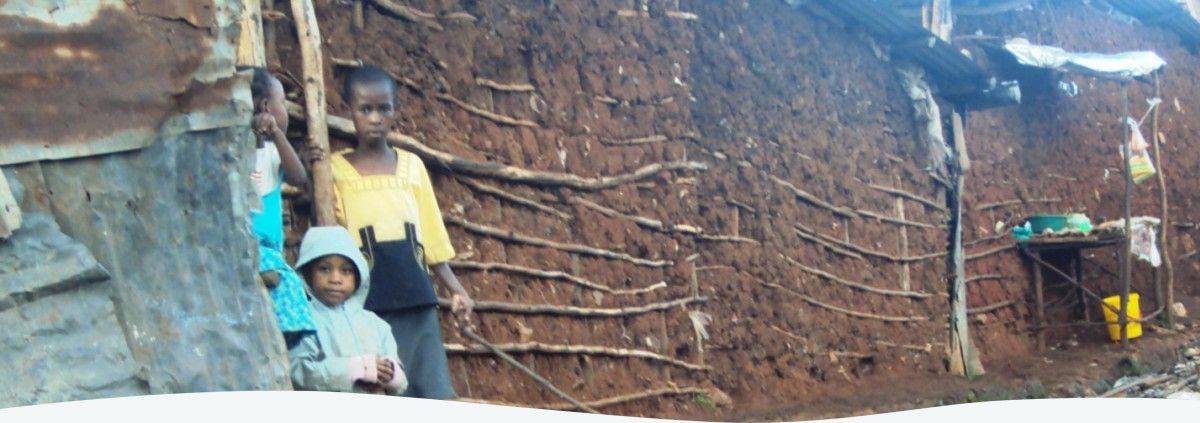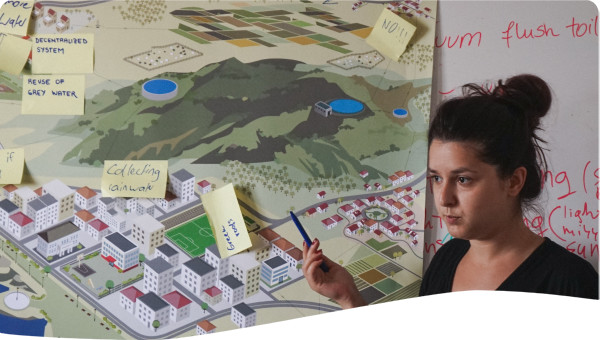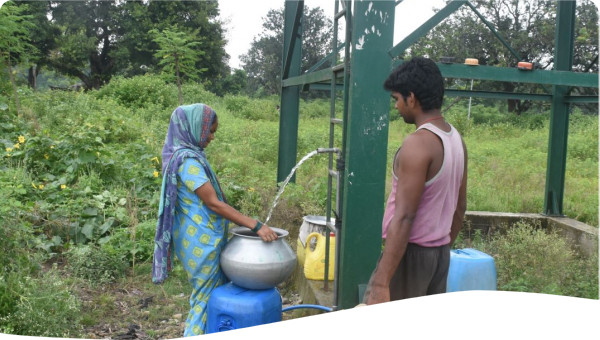Water and sanitation issues in informal settlements have been addressed using various interventions, however some have been taken over by gangs/cartels that exploit the residents, leading to illegal connections resulting in leakages, thus supplying contaminated water, charging rates 10 times higher than those charged by the utility. The Water Act of 2002 called for a partnership approach in the provision of water and sanitation services. Through this participatory approach, it was possible to come up with a custom-made solution to formalize water and sanitation supply in Mathare, involving the utility Nairobi Water, the NGO Pamoja Trust, Akiba Mashinani, WSTF, and the Mathare Community.
Mathare, one of Nairobi's informal settlements, had long faced significant challenges in terms of water and sanitation. The failure of the state to fulfill its obligations and provide adequate infrastructure and services resulted in a glaring gap between informal settlements and planned urban areas. Water and sanitation had emerged as pressing issues that highlighted these systemic failures.
Mathare is located in the southeastern part of Nairobi, within the Mathare Division. According to the most recent population census in 2019, Mathare Division had a population of 87,097.
Mathare also has some areas of public land, such as Mashimoni, which belonged to the Air Force, and Kosovo, which was hived off from land previously used as a Police Depot and government-owned Mathari Mental Hospital. These public land areas were selected as pilot sites for projects aimed at formalizing water supply and improving sanitation. Kosovo, in particular, stood out as it was partially planned, with clear provisions for roads and a sense of symmetry in plot allocation. However, the reality on the ground was that many plots had changed hands since the initial allocation process.
The complex land tenure situation in Mathare has hindered public investment in improving amenities, including water and sanitation infrastructure. Resolving land disputes and establishing clear land tenure systems are crucial steps to facilitate effective public investment and implement sustainable water and sanitation projects.
In Mathare, most residents relied on illegal connections for water and electricity for many years. In 2007, the government initiated mass disconnection operations to address the issue of illegal connections, affecting both illegal and legal connections. These disconnections resulted in a public outcry as residents, who had been held hostage by cartels and illegal gangs diverting revenue from utility companies, faced frequent outbreaks of waterborne diseases from contaminated water supplied through poor-quality piping. In response, the government required utility companies to install temporary emergency measures and develop plans for formal service provision in informal settlements.
The Water Act of 2002 separated the roles of different water stakeholders and called for partnerships between various stakeholders in water and sanitation services provision to the citizens. Consequently, Nairobi Water and Athi Water Service Board established the Informal Settlements Department (ISD) in 2008. In 2009, strategic guidelines were drafted to improve water supply.
The primary objective of this case study is to explain how different stakeholders, namely the utility Nairobi City Water and Sewerage Company, the NGO Pamoja Trust working with the community, the Mathare Community Members, the Water Service Trust Fund providing funding, and Akiba Mashinani Trust offering a credit of Ksh 5000 to the community, are actively engaged in water and sanitation services through partnership.
In response to the pressing need for clean water in Mathare slums, a series of targeted actions were undertaken. First, a gender-disaggregated survey was conducted to gain insights into the specific water requirements and challenges faced by women in the community. This survey laid the foundation for involving women in the planning and decision-making processes for selecting and implementing water sources and infrastructure. This was followed by establishment of dedicated water committees with active participation from women.
Efforts to enhance sanitation and hygiene practices in Mathare were multifaceted. The construction of two sanitation blocks was initiated—one for the community and another for a local school. This has resolved the issue of shared toilets and addressed the safety concerns of schoolchildren, particularly girls. Awareness campaigns tailored to the specific needs and preferences of women were conducted, promoting better sanitation and hygiene habits. Additionally, women were trained as community hygiene promoters, equipped to spread knowledge and drive behavioral change within their households and the broader community. These initiatives ensured that women had access to gender-friendly sanitation facilities, including separate toilets and communal bathrooms, preserving their privacy, safety, and dignity.
Recognizing the undue burden placed on women in water collection and management, comprehensive actions were taken. Thirty-two community water kiosks were constructed, and a 26-kilometer pipeline was laid throughout Mathare. This infrastructure shortened the distances women had to travel to fetch water and reduced the time spent. Importantly, the development of these water supply systems took into account the input of women, aligning with their schedules and preferences.
The Nairobi City Water and Sewerage Company implemented a Prepaid (token) metering system, wherein water was priced at 50 cents, significantly lower than the previous rate of 10 Kenyan Shillings. This initiative resulted in notable economic empowerment for women, as it led to a reduction in their expenses and an increase in their savings. Furthermore, the introduction of prepaid meters contributed to a substantial decrease in water losses, particularly in a context where water is a scarce resource. This reduction in non-revenue water losses also translated into increased revenue for the company. Additionally, the water officials disseminated practical advice to a female farmer on minimizing water loss through the effective utilization of drip irrigation techniques.
Empowering women through skill development and income generation was a key aspect of the intervention. Women participated in training programs covering water and sanitation management, construction, maintenance, and repair, enabling them to actively contribute to improving water and sanitation systems. Simultaneously, women's entrepreneurship initiatives were established, particularly for water and sanitation, including the construction of water kiosks. Facilitating access to microfinance and specialized loans designed for women was instrumental in overcoming financial barriers, particularly the steep Ksh 5000 connection fee, enabling women to access essential water connections.
To ensure that women had a meaningful role in decision-making processes, capacity-building workshops and training sessions were organized. Both men and women in the Mathare community benefited from these sessions, which covered leadership, operation and maintenance, negotiation, and advocacy skills. These initiatives aimed to increase women's representation and participation in various committees, including lane, cluster, and oversight committees, as well as community meetings, fostering a more inclusive and empowered community.
These outcomes collectively reflect the positive impact of the project in addressing water and sanitation challenges while empowering women and enhancing community well-being.
Improved Access to Clean Water and Enhanced Safety: The construction of 32 water kiosks, the laying of 26 km of water pipelines, and the establishment of two sanitation blocks have significantly increased the availability of clean and safe water sources within the informal settlement. These infrastructure developments have notably benefited the community by providing reliable access to clean water and improved sanitation facilities. The establishment of water kiosks and household connections in closer proximity to residential areas has brought convenience and safety to women. They no longer need to undertake long journeys or face potential risks to fetch water, resulting in an overall improvement in their well-being.
Sanitation Improvement and Better Hygiene Practices: The project improved sanitation facilities within the informal settlement by constructing two ablution blocks—one for a school and the other for the community. The maintenance of gender-responsive public toilets was a priority, ensuring enhanced privacy and dignity, especially for women, girls, and children. This improvement has promoted better hygiene practices and contributed to improved overall community health. The project also focused on increasing knowledge and awareness of proper sanitation practices, particularly among women and girls. This educational component resulted in improved hygiene practices, reducing the risk of waterborne diseases and enhancing community health.
Empowering Women as Advocates and Improved Representation: Women empowered as leaders and advocates for improved sanitation practices within the community have become agents of change. Through their active involvement, they have promoted positive behavioral changes and influenced others to adopt proper sanitation practices. Community-based water and sanitation committees were strengthened, ensuring equal representation of women. This approach allowed women to take leadership roles and significantly influence decision-making processes, ensuring their perspectives were heard and considered. In addition, the reduction in the distance and time required to access water has particularly benefited women and girls, who were traditionally responsible for water collection. This reduction in the burden has allowed them to redirect their time and energy toward education and income-generating activities, enhancing their overall quality of life.
Formal service provision in urban slums is possible with professional management and leads to improved water and sanitation services. Collaborative partnerships between utilities, NGOs, and the community are crucial for achieving sustainable improvements. These partnerships leverage diverse expertise and resources to address complex challenges in informal settlements effectively.
Empowering women through training, leadership opportunities, and access to resources not only enhances water and sanitation services but also has broader societal impacts, including improved education and income-generating activities. Empowered women become agents of change within their communities.
Tailoring interventions to meet the specific needs and preferences of the community, particularly women, is essential for success. Inclusive decision-making processes and community ownership play a pivotal role in achieving sustainable solutions in informal settlements.
 Case studies
Case studies

